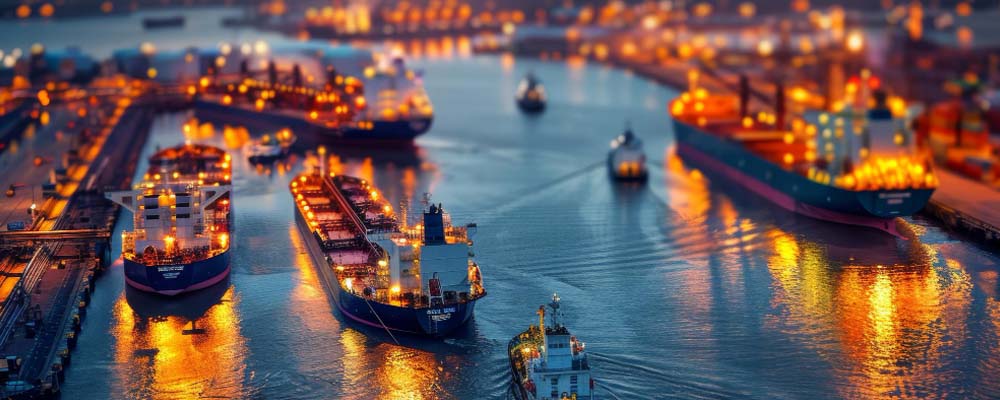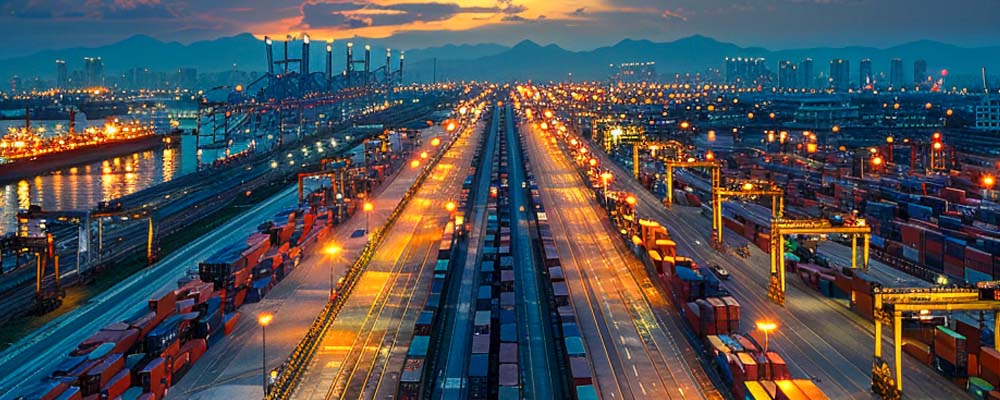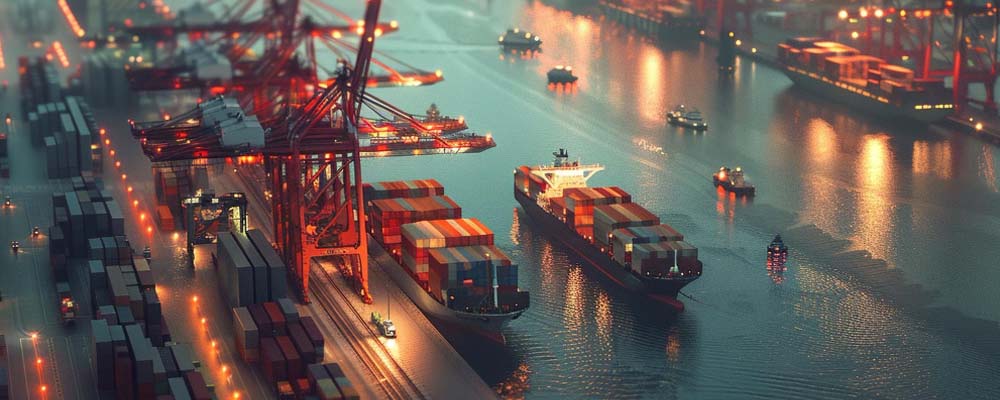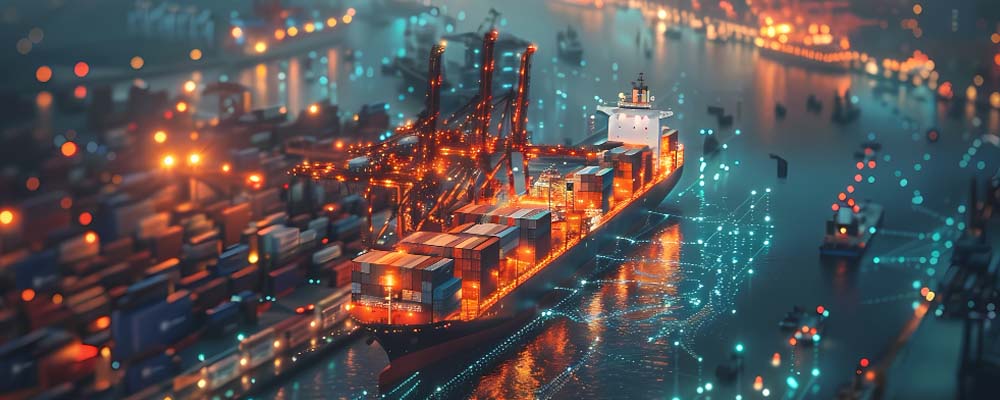
India, with its extensive coastline of over 7,500 kilometers, boasts a network of major ports that facilitate international trade. These ports are essential gateways for the movement of goods, playing a vital role in the country’s economic growth.
Understanding these ports’ capabilities, locations, and specialties can help freight forwarding companies, logistics providers, importers, exporters, and other stakeholders optimize their operations, reduce costs, and streamline supply chains.
Join us as we explore India’s top 10 major ports, uncovering their unique features and why they matter to your business.
1. Mumbai Port Trust
Strategic Location and Historical Significance
Mumbai Port Trust, located on the west coast of India, is one of the oldest and most significant ports in the country. Established in the 19th century, it has played a crucial role in India’s maritime history. Its strategic location makes it a key gateway for international trade.
Modern Facilities and Connectivity
Mumbai Port Trust offers state-of-the-art facilities, including deep-water berths, container terminals, and advanced cargo handling equipment. The port’s excellent connectivity to major highways and rail networks ensures seamless transportation of goods across the country.
Import-Export Hub
The port handles various cargo types, including petroleum products, chemicals, textiles, and machinery. Its status as an import-export hub makes it a vital asset for businesses involved in international trade.
2. Jawaharlal Nehru Port Trust (JNPT)
India’s Largest Container Port
Jawaharlal Nehru Port Trust, also known as Nhava Sheva, is India’s largest container port. Located near Mumbai, it handles a significant portion of India’s containerized cargo, making it a critical player in the country’s logistics network.
Advanced Infrastructure
JNPT boasts world-class infrastructure, including modern container terminals, automated cargo handling systems, and efficient customs procedures. These features ensure quick turnaround times and minimal delays for cargo shipments.
Global Trade Facilitator
With its strategic location and advanced facilities, JNPT plays a vital role in facilitating global trade. It connects Indian businesses to international markets, helping them expand their reach and competitiveness.
3. Chennai Port
Southern India’s Gateway
Chennai Port, situated on the southeastern coast of India, is a major hub for trade in southern India. It serves as a crucial gateway for exports and imports in the region, supporting various industries, including automotive, textiles, and electronics.
Diverse Cargo Handling
The port handles a diverse range of cargo, including containers, automobiles, bulk commodities, and petroleum products. Its versatility makes it an essential asset for businesses with varied shipping requirements.
Infrastructure and Connectivity
Chennai Port offers modern infrastructure, including container terminals, breakbulk facilities, and efficient road and rail connectivity. These features ensure smooth cargo movement and reduced transit times.
 4. Kandla Port
4. Kandla Port
Strategic Location in Gujarat
Kandla Port, located in Gujarat, is one of India’s busiest and most strategically important ports. Its proximity to major industrial hubs and agricultural regions makes it a vital node in the country’s logistics network.
Special Economic Zone (SEZ)
Kandla Port hosts a Special Economic Zone (SEZ), offering various incentives and benefits to businesses operating within the zone. This SEZ has attracted numerous industries, including petrochemicals, textiles, and manufacturing.
Efficient Cargo Handling
The port is known for its efficient cargo handling capabilities, with advanced equipment and well-trained personnel ensuring quick turnaround times. This efficiency is a significant advantage for businesses looking to reduce logistics costs.
5. Visakhapatnam Port
Eastern India’s Largest Port
Visakhapatnam Port, situated on the eastern coast of India, is the largest port in the region. It serves as a crucial gateway for trade with Southeast Asia and the Far East, making it an essential player in India’s international trade.
Versatile Cargo Handling
The port handles a wide range of cargo, including iron ore, coal, petroleum products, and containers. Its versatility allows businesses to efficiently transport various goods to and from the eastern region.
Modern Facilities and Connectivity
Visakhapatnam Port offers modern facilities, including deep-water berths, container terminals, and efficient road and rail connectivity. These features ensure smooth cargo movement and reduced transit times.
6. Kolkata Port Trust
Gateway to Eastern India
Kolkata Port Trust, located on the Hooghly River, is a major port serving eastern India. It plays a crucial role in facilitating trade with neighboring countries, including Bangladesh, Nepal, and Bhutan.
Riverine Port Advantages
Being a riverine port, Kolkata Port Trust offers unique advantages, such as reduced transit times for cargo destined for northeastern India and neighboring countries. This makes it a valuable asset for businesses operating in these regions.
Diverse Cargo Handling
The port manages an extensive variety of cargo, encompassing containers, bulk commodities, and petroleum products. Its versatility allows businesses to efficiently transport various goods to and from eastern India.
7. Cochin Port Trust
Gateway to South India
Cochin Port Trust, situated on the southwestern coast of India, is a major hub for trade in southern India. It serves as a crucial gateway for exports and imports in the region, supporting various industries, including spices, seafood, and tourism.
Modern Container Terminals
The port boasts modern container terminals, efficient cargo handling systems, and advanced infrastructure. These features ensure quick turnaround times and minimal delays for cargo shipments.
Strategic Location
Cochin Port Trust’s strategic location makes it an ideal choice for businesses looking to trade with the Middle East, Africa, and Europe. Its proximity to international shipping routes enhances its significance in global trade.
 8. Mormugao Port Trust
8. Mormugao Port Trust
Goa’s Maritime Hub
Mormugao Port Trust, located in Goa, is a key player in India’s maritime trade. It serves as a crucial gateway for exports and imports in the region, supporting various industries, including mining, tourism, and agriculture.
Efficient Cargo Handling
The port is known for its efficient cargo handling capabilities, with advanced equipment and well-trained personnel ensuring quick turnaround times. This efficiency is a significant advantage for businesses looking to reduce logistics costs.
Versatile Cargo Handling
The port handles a diverse range of cargo, including iron ore, coal, and containers. Its versatility makes it an essential asset for businesses with varied shipping requirements.
9. Paradip Port
Strategic Location in Odisha
Paradip Port, located in Odisha, is one of India’s largest and most strategically important ports. Its proximity to major industrial hubs and agricultural regions makes it a vital node in the country’s logistics network.
Specialized Cargo Handling
The port specializes in handling bulk commodities, including iron ore, coal, and petroleum products. Its specialization allows businesses to efficiently transport large volumes of cargo to and from the region.
Modern Facilities and Connectivity
Paradip Port offers modern facilities, including deep-water berths, efficient cargo handling systems, and excellent road and rail connectivity. These features ensure smooth cargo movement and reduced transit times.
10. New Mangalore Port Trust
Gateway to Karnataka
New Mangalore Port Trust, situated on the southwestern coast of India, is a major hub for trade in Karnataka. It serves as a crucial gateway for exports and imports in the region, supporting various industries, including agriculture, manufacturing, and tourism.
Diverse Cargo Handling
The port manages an extensive variety of cargo, encompassing containers, bulk commodities, and petroleum products. Its versatility allows businesses to efficiently transport various goods to and from Karnataka.
Modern Infrastructure
The New Mangalore Port Trust provides state-of-the-art infrastructure, encompassing container terminals, efficient cargo handling systems, and advanced connectivity solutions. These features ensure quick turnaround times and minimal delays for cargo shipments.
 Conclusion
Conclusion
India’s major ports are the backbone of its international trade, providing essential gateways for the movement of goods. Understanding the capabilities and advantages of these ports can help businesses optimize their logistics operations, reduce costs, and enhance their competitiveness in the global market. Leveraging the strengths of India’s top ports is crucial for your success.
Explore the possibilities, streamline your supply chain, and take your business to new heights by tapping into the potential of India’s maritime marvels.




 4. Kandla Port
4. Kandla Port 8. Mormugao Port Trust
8. Mormugao Port Trust Conclusion
Conclusion



